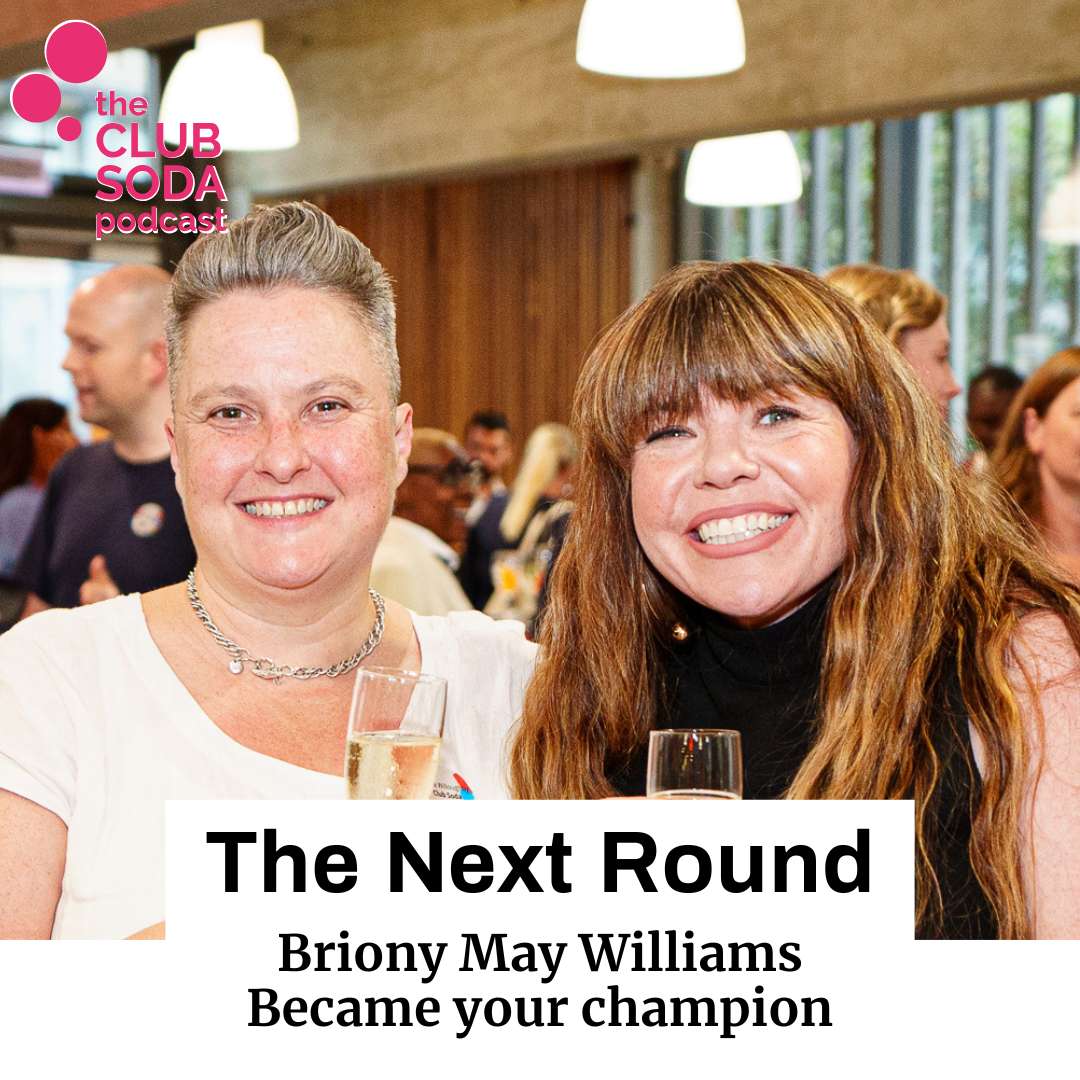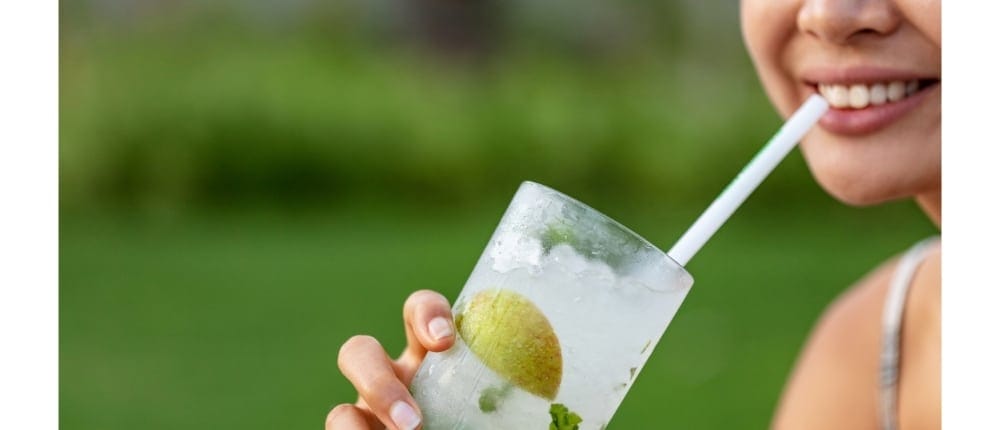
This website uses cookies to improve your experience. We'll assume you're ok with this, but you can opt-out if you wish. Read More
The Next Round: What happens after you change your drinking?

Did you know that alcohol and other drinks can have serious effects on the health of your mouth and teeth? In this week’s blog, dentist James Goolnik explains how you can mitigate the effects of drinks on your dental health, especially as you are transitioning your drinking.
This one is particularly useful to those who are moderating if they want to take into account how different alcoholic drinks affect their dental health. We will be sharing more from James soon about alcohol-free drinks and dental health. Let’s start by breaking it down into acids and sugar.
Just like the rest of your body, your mouth needs a balanced pH. When we drink anything acidic our saliva tries really hard to get back to neutral. It takes around 30 minutes after a drink for this to happen. If you are sipping anything acidic you are basically dipping your teeth in acid. This starts to dissolve your enamel (the outer coating of your teeth and the hardest substance in your body)
leading to sensitive teeth which then start to look yellow and then grey. This is known as dental erosion and is a growing problem.
Any fizzy or carbonated drinks, most juices, smoothies, beer and wine. Even fizzy water can dissolve our teeth. The safest drinks for our teeth are water and milk. Drinks high in alcohol, like spirits, dry the mouth stopping our saliva from doing its job of protecting our dental health, putting us at higher risk of tooth decay, gum disease and mouth cancer. Alcohol is linked to nearly a third of all mouth cancers. What’s worse, if you both smoke and drink you’re up to 30 times more likely to develop oral cancer. We advise you to see a dentist at least every 18 months to screen you for mouth cancer and any ulcer that has not healed within 3 weeks must be examined by a dentist.
Firstly, try and limit the frequency and then the time you expose your mouth to acids. Think about having a drink with a meal or neutralising the acid after finishing your drink. You can neutralise this acid with a swill of water, using a straw, sugar-free chewing gum or a neutral food. We advise waiting for 30 minutes before brushing your teeth to reduce any further acid damage. If you want to brush straight after a drink, first rinse with some water for 30 seconds and then brush your teeth. Sensitive toothpaste can help reduce this sensitivity but can take around a week to work. If you do have sensitivity that lasts longer than this then it is important to see a dentist to find out the cause.
Sugar is highly addictive because it acts on the pleasure centre of the brain, as does alcohol. This makes for a dangerous duo for your dental health. Alcoholic drinks that are mixed with soft drinks are so easy to consume, making it easy to forget how much sugar you’ve really consumed. You probably know that sugar and carbohydrates lead to dental cavities. The bacteria in your mouth eat the sugar you feed them and produce acid that dissolves (demineralises) your teeth leading to a cavity. If the cavity is deep you need to see a dentist to get it treated. A shallow cavity can be reversed over time if you change your diet. The best way to do this is to reduce the frequency of sugar in your diet.
Sugar has also proven to lead to increasing your body’s inflammation. Dentists know that gum disease in diabetic patients is more aggressive, leading to faster breakdown of their gums and the bones around their teeth, eventually resulting in losing your teeth. Bleeding gums are common but it is not normal. This is the first sign of gum disease and can be reversed with improved dental health with good oral hygiene. We start by reducing the frequency of eating or drinking sugar. Some people find transitioning from full sugar drinks to low sugar or diet versions helps them. We need to be aware that these still are sweet, so your body continues to crave that sweetness. Research shows that it takes around six days of cutting down on sugar and carbohydrates for your palate to recalibrate and then you can fully appreciate flavours and taste.
You may need to increase the amount of water you drink to help flush toxins away from your body during your detox. Contrary to popular belief, you cannot brush away tooth decay. Tooth decay is all down to what you eat and drink. Brushing will remove food and bacteria, freshen your breath and help prevent gum disease, but has very little effect on tooth decay.
If you’re looking for a low sugar option when it comes to wine, red is your best choice:
Spirits with high alcohol volumes tend to not contain many carbs or sugar. Spirits such as tequila, gin, brandy, rum and whiskey included. These are the best choices if you’re looking for low sugar beverages to reduce dental health harm. Our top tip is to mix your hard spirits with soda water or light tonic water and a fruit slice such as lemon or lime. This will keep those sugar levels at their lowest, so opt for the following:
Red wine and drinks such as coca cola, often used as a mixer, can stain your teeth. Brushing your teeth twice a day can help reduce this, along with regular visits to your dental hygienist. Try and avoid abrasive or charcoal toothpastes as they will remove part of your enamel as well as the stain. Speak to your dentist about your teeth whitening options. They will use hydrogen peroxide gels that safely lift away stains without any structural damage to your teeth.
Your dental health team can help you protect your teeth and have lower dental bills in the future. If you are becoming more mindful about your drinking do not forgot to involve your dental team.
Are you looking to lower your sugar intake? Why not try some of the delicious recipes in the charity cookbook Kick Sugar written by the founder of Bow Lane Dental Group and our resident dentist James Goolnik. His book, written in collaboration with other healthcare specialists will also help you reduce your alcohol consumption at the same time. If you are interested in boosting your health, your immune system and your mental health check it out (buy Kick Sugar on Amazon UK, on Amazon US on Amazon Canada or Amazon Australia). All the proceeds go to the charity Rewards Project aiming to make schools and nurseries sugar-free.
Club Soda is an Amazon Associate and earns a fee from all qualifying Amazon purchases made using affiliate links featured on this site.
This website uses cookies to improve your experience. We'll assume you're ok with this, but you can opt-out if you wish. Read More
| Name | Domain | Purpose | Expiry | Type |
|---|---|---|---|---|
| wpl_user_preference | joinclubsoda.com | WP GDPR Cookie Consent Preferences. | 1 year | HTTP |
| PHPSESSID | www.tickettailor.com | PHP generic session cookie. | 55 years | HTTP |
| AWSALB | www.tickettailor.com | Amazon Web Services Load Balancer cookie. | 7 days | HTTP |
| YSC | youtube.com | YouTube session cookie. | 55 years | HTTP |
| Name | Domain | Purpose | Expiry | Type |
|---|---|---|---|---|
| VISITOR_INFO1_LIVE | youtube.com | YouTube cookie. | 6 months | HTTP |
| Name | Domain | Purpose | Expiry | Type |
|---|---|---|---|---|
| _ga | joinclubsoda.com | Google Universal Analytics long-time unique user tracking identifier. | 2 years | HTTP |
| sbjs_migrations | joinclubsoda.com | Sourcebuster tracking cookie | 55 years | HTTP |
| sbjs_current_add | joinclubsoda.com | Sourcebuster tracking cookie | 55 years | HTTP |
| sbjs_first_add | joinclubsoda.com | Sourcebuster tracking cookie | 55 years | HTTP |
| sbjs_current | joinclubsoda.com | Sourcebuster tracking cookie | 55 years | HTTP |
| sbjs_first | joinclubsoda.com | Sourcebuster tracking cookie | 55 years | HTTP |
| sbjs_udata | joinclubsoda.com | Sourcebuster tracking cookie | 55 years | HTTP |
| sbjs_session | joinclubsoda.com | SourceBuster Tracking session | Session | HTTP |
| Name | Domain | Purpose | Expiry | Type |
|---|---|---|---|---|
| mailchimp_landing_site | joinclubsoda.com | Mailchimp functional cookie | 28 days | HTTP |
| __cf_bm | tickettailor.com | Generic CloudFlare functional cookie. | Session | HTTP |
| NID | google.com | Google unique id for preferences. | 6 months | HTTP |
| Name | Domain | Purpose | Expiry | Type |
|---|---|---|---|---|
| _ga_10XZMT03ZM | joinclubsoda.com | --- | 2 years | --- |
| AWSALBCORS | www.tickettailor.com | --- | 7 days | --- |
| cf_clearance | tickettailor.com | --- | 1 year | --- |
| VISITOR_PRIVACY_METADATA | youtube.com | --- | 6 months | --- |
Join Club Soda for 10% off your first order of drinks for UK delivery. Plus get our latest news and special offers for members to choose better drinks, change your drinking and connect with others.
If you get an error message with this form, you can also sign up at eepurl.com/dl5hPn